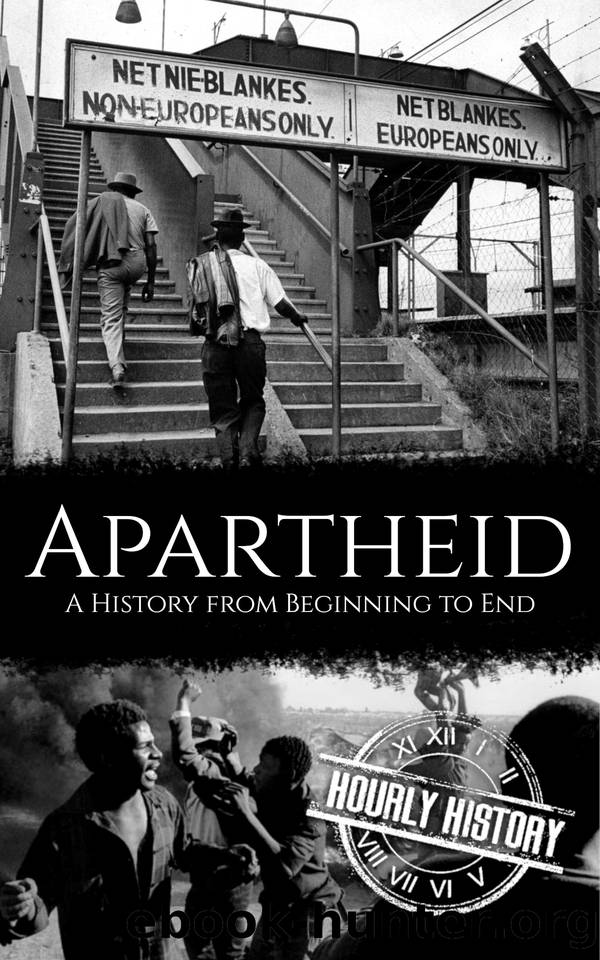Apartheid: A History from Beginning to End by History Hourly

Author:History, Hourly
Language: eng
Format: epub
Publisher: Hourly History
Published: 2023-05-07T00:00:00+00:00
Chapter Six
Mandela and the Spear of the Nation
âWhat counts in life is not the mere fact that we have lived. It is what difference we have made to the lives of others that will determine the significance of the life we lead.â
âNelson Mandela
The Sharpeville massacre fundamentally changed the political situation within South Africa. Under the state of emergency declared on March 30, 1960, martial law was introduced across South Africa, and both the ANC and the PAC were declared illegal organizations. The leaders of the ANC who had been arrested following the declaration of a state of emergency were held without trial or charge for five months before being released.
The ANC subsequently became an underground movement, holding meetings in secret. Nelson Mandela traveled throughout South Africa in disguise helping to organize cells for the movement. Then, in 1961, Mandela and two othersâJoe Slovo and Walter Sisuluâformed a new, radical paramilitary group called Spear of the Nation (usually abbreviated as MK). The purpose of this new group was to begin an armed struggle against apartheid.
Initially, Mandela, Sisulu, and Slovo were keen to emphasize that Spear of the Nation was an entirely separate group, but soon, it came to be regarded as the armed and militant wing of the ANC. While it was formed to undertake sabotage operations, the founding members of Spear of the Nation were also keen to stress that it should avoid causing loss of life. To mark the beginning of its activities, it released a statement noting that while the new paramilitary would undertake sabotage aimed at undermining the regime in South Africa, the focus of the campaign would be government facilities, including power and telephone infrastructure, and the burning of crops. These activities were to be undertaken at night to minimize the risk of causing casualties.
Meanwhile, the PAC, banned at the same time as the ANC, created its own paramilitary wing, Poqo (meaning âpureâ), which was also dedicated to the overthrow of the government of South Africa and apartheid, but from its inception, the campaign directed by Poqo targeted people as well as infrastructure. The people who became targets of Poqo attacks in the 1960s were mainly (but not exclusively) police officers, police informers, and leaders believed to support apartheid. In 1962, around 250 members of Poqo armed with spears and machetes marched on the town of Paarl, where they attacked homes, shops, and the police station. Two white civilians were killed during this attack. In February 1963, members of two white families camping near the Bashee River in the Transkei region were brutally hacked to death by members of Poqo.
As a direct response to these and other acts of violence, the Minister of Justice, John Vorster, introduced new and even more repressive acts. The Sabotage Act and the 90-day law gave the government powers to arrest and detain people without trial. A combination of these new laws and a lack of large-scale popular support because of its virulently anti-white stance meant that Poqo never gained the popular support it needed.
Download
This site does not store any files on its server. We only index and link to content provided by other sites. Please contact the content providers to delete copyright contents if any and email us, we'll remove relevant links or contents immediately.
| Central Africa | East Africa |
| North Africa | Southern Africa |
| West Africa | Algeria |
| Egypt | Ethiopia |
| Kenya | Nigeria |
| South Africa | Sudan |
| Zimbabwe |
Goodbye Paradise(2969)
Men at Arms by Terry Pratchett(2407)
Tobruk by Peter Fitzsimons(2063)
Pirate Alley by Terry McKnight(1910)
Arabs by Eugene Rogan(1836)
Borders by unknow(1788)
Belonging by Unknown(1468)
The Biafra Story by Frederick Forsyth(1324)
It's Our Turn to Eat by Michela Wrong(1305)
Botswana--Culture Smart! by Michael Main(1238)
A Winter in Arabia by Freya Stark(1225)
Gandhi by Ramachandra Guha(1196)
Coffee: From Bean to Barista by Robert W. Thurston(1182)
Livingstone by Tim Jeal(1152)
The Falls by Unknown(1142)
The Source by James A. Michener(1135)
The Shield and The Sword by Ernle Bradford(1101)
Egyptian Mythology A Fascinating Guide to Understanding the Gods, Goddesses, Monsters, and Mortals (Greek Mythology - Norse Mythology - Egyptian Mythology) by Matt Clayton(1088)
Africa: Altered States, Ordinary Miracles by Richard Dowden(1078)
